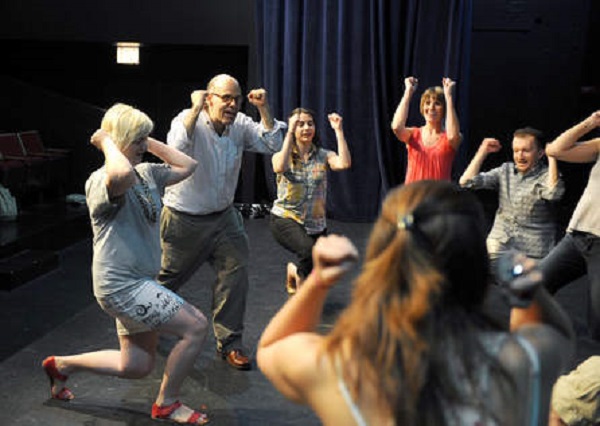5 Tips To Make You Better Improv Teacher Instantly

I have been teaching improv for a very, very, very long time. I never actually set out to be an improv teacher. I just started doing it to make ends meet while I waited for my big break, but over the years, I found that not only did I really enjoy it, but I was good at it too.
But I didn’t start out being good. In the beginning I tried way too hard, I was too controlling, and it wasn’t nearly as much fun. But I kept asking other people for help, experimenting with new methods, and kept working at letting go, and slowly, teaching became easier and more enjoyable.
So today, I thought I’d share 5 tips that I have learned that have made me a better improv teacher. If you are starting to teach, I hope these can help you, too.
1. Before each class, ask yourself, “What can I learn from the students?”
This will keep you humble and open you to new ways to do things. By doing this you, are practicing having a "Beginner’s Mind," which is the ability to let go of any learned ideas and concepts about the world so that you can approach a situation from a new perspective. And this is essential in improv.
2. Spend a lot of time playing warm-up games
Some improv teachers want to cut right to scene work or long form before doing warm-up games. Yes, warm up games take time, and they can seem silly. But they are as important for the students as they are for the teacher. For students, warm up games get them to loosen up and take more risks. For teachers, warm up games give you the opportunity to assess the class’s energy for that day and adjust your lesson plan depending on how they are.
Each day, your students will come into class with a totally different energy, and it’s important to adjust your teaching to how they are feeling.
I remember one time my students came into class all tired and with low energy. Maybe it was the weather or the traffic or that they had just had a shitty day at work, but when they began to warm up, they looked like they were zombies. They had brought their day into class, which gave me an opportunity to make an adjustment. I had them walk around the room and talk about their shitty day and how they were feeling. This helped me know where they were at so I didn't need to take it personally and so I could keep adjusting to the energy. And once they had a chance to speak about how they were feeling, their negative energy seemed to lift.
3. Always be improvising
Speaking of lesson plans, always be improvising with your lesson plan. If you are at an institution, you may have to follow a syllabus, but you can still improvise within that. If you don't need to follow one, then try improvising even more with what you are teaching them. Most of the time, I go into class roughly knowing what I want to teach but I don’t have a set lesson plan. I’ve found the times when I work off my students turn out to be some of my best classes because I am in-tune with them and what they need instead of trying to force them somewhere else.
4. Let the exercises do the talking
Some teachers, like me, can talk too much. But the more I talk, the less time the students have to experience things on their own. So, what I have found helpful is instead of answering every question that students have, I often try to come up with exercises to demonstrate the concept. For example, if a student asks me a question about "agreement," instead of answering them, I have them do an exercise that illustrates the point I would have made. I’ve found that this is always better for the student. This is also a good example of improvising the lesson plan.
5. You don’t need to know the answers
When a student asks a question in class and you don't know what to say, ask the class to answer it and you will be surprised at the brilliant responses you will get. And sometimes after they respond, it can inspire you to come up with an answer that you had not even thought of because you let them speak first.
I came across a great quote from master teacher Mick Napier from The Annoyance Theater that sums this up perfectly: “I don’t know the answer. A good teacher says: ‘Let’s figure it out together.’”
I hope these tips help you. Let me know how they go. And if you're an improv teacher, I'd love to hear what some of your tips are to having a better class below!


Hey Jimmy,
Well you were right once again! I took these suggestions into my class that I taught over the holiday weekend. I figured no one would show up because of Labor Day but they did! So I had 15 very enthusiastic adults between the ages of 25-85, with various levels of experience, who wanted a Drop In Improv class and I was just the guy to give it to them. Because my energy was low I used all your suggestion in this blog to help me and they worked! All the warm-up games warmed me up, I improvised with my lesson plan, and I learned something from my students...Never underestmate their ability to surprise and teach me!